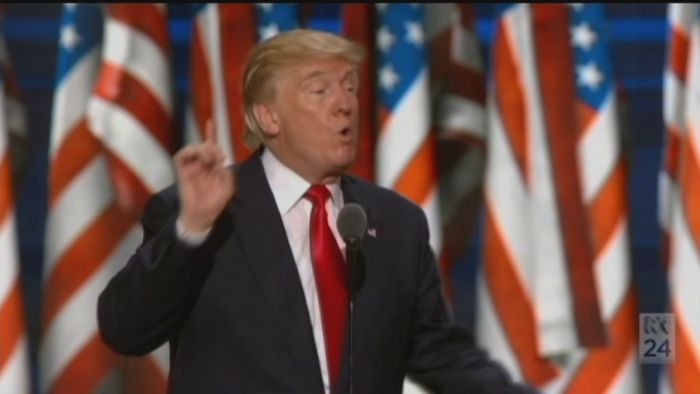Donald Trump says US election 'absolutely' not affected by Russian cyber attacks
Updated
 Video: Donald Trump says the cyber attack claims are a bid to delegitimise his election victory.
(ABC News)
Video: Donald Trump says the cyber attack claims are a bid to delegitimise his election victory.
(ABC News)
US President-elect Donald Trump says the outcome of the 2016 US election was not affected by cyber attacks, after intelligence agencies briefed him on their conclusion that Russia staged cyber attacks during the campaign.
Key points:
- Russia has denied US Government allegations of hacking during election campaign
- Trump has repeatedly disparaged the conclusions of intelligence agencies
- Intelligence agencies release unclassified version of hacking report
Shortly after the meeting wrapped up, US intelligence agencies released an unclassified report confirming reports they believe that Russian President Vladimir Putin ordered a hidden campaign to influence the election in favour of Mr Trump.
Having hours earlier dismissed the controversy as a "political witch-hunt", Mr Trump later issued a statement deflecting questions about the legitimacy of his November 8 victory over Democratic Party candidate Hillary Clinton.
Mr Trump said "Russia, China, other countries, outside groups and people" sought to attack US institutions including the Democratic National Committee.
"There was absolutely no effect on the outcome of the election including the fact that there was no tampering whatsoever with voting machines," he said.
The statement was Mr Trump's first acknowledgement that the Russian Government may have directed the cyber attacks in the lead up to the US election, which embarrassed the Democrats.
The New York businessman, who is to be inaugurated as president on January 20, said he would appoint a team to give him a plan within 90 days of taking office on how to prevent cyber attacks.
But he suggested he would keep their recommendations secret.
"The methods, tools and tactics we use to keep America safe should not be a public discussion that will benefit those who seek to do us harm," Mr Trump said.
Intelligence agencies release unclassified hacking report
Since being accused of cyber attacks in July, Russia has denied the US Government's allegations of hacking during the election campaign.
The unclassified report released by intelligence agencies said "Russia's goals were to undermine public faith in the US democratic process, denigrate Secretary Clinton and harm her electability and potential presidency".
"We further assess Putin and the Russian Government developed a clear preference for President-elect Trump," he said.
Vice President-elect Mike Pence said the intelligence briefing was "constructive and respectful" and that in the early days of his Government Mr Trump will move to prevent any future cyber hacking.
"The President-elect has made it very clear that we are going to take aggressive action in the early days of our administration to combat cyber attacks and protect the American people from this type of intrusion in the future," Mr Pence said.
Citing increasingly sophisticated cyber threats and an election infrastructure that is "vital to our national interests", Homeland Security Secretary Jeh Johnson said he was designating US election systems critical infrastructure.
The move provides more federal help for state and local governments to keep their election systems safe from tampering.
'This is a political witch-hunt'
The briefing coincided with deep tension between the intelligence agencies and Mr Trump, who has disparaged their conclusions that Russia's cyber attacks were intended to interfere in the election by hacking Democratic Party institutions and Mrs Clinton's campaign staff.
Top US intelligence official James Clapper on Thursday told Congress he was "even more resolute" in his belief that Russia staged cyber attacks on Democrats during the election campaign.
 Video: The head of US intelligence says Russia's hacking program poses a major threat to US interests.
(ABC News)
Video: The head of US intelligence says Russia's hacking program poses a major threat to US interests.
(ABC News)
In a telephone interview with the New York Times before his briefing with intelligence officials, Mr Trump dismissed the controversy.
"China, relatively recently, hacked 20 million government names," he said, referring to the Office of Personnel Management breach in 2014 and 2015.
"How come nobody even talks about that? This is a political witch-hunt."
Mr Trump's questioning of the intelligence agencies' conclusions has drawn the ire of Democrats and fellow Republicans alike.
Senators John McCain and Lindsey Graham, both Republicans who took part in a Senate hearing with US spy chiefs on Thursday, have called for further congressional inquiries.
Outgoing US Vice-President Joe Biden a day earlier said it was "dangerous" for the President-elect to publicly criticise the US intelligence community and "absolutely mindless" for a President not to have confidence in or listen to the agencies.
In the same interview, Mr Biden said it was time for Mr Trump "to be an adult".
Reuters
Topics: us-elections, hacking, forms-of-government, crime, united-states, china, russian-federation
First posted






